Attached files
| file | filename |
|---|---|
| 8-K - 8-K - Ally Financial Inc. | allyfinancialoutlookconfer.htm |

1
Ally Financial Inc.
Financial Outlook Update
March 21, 2017
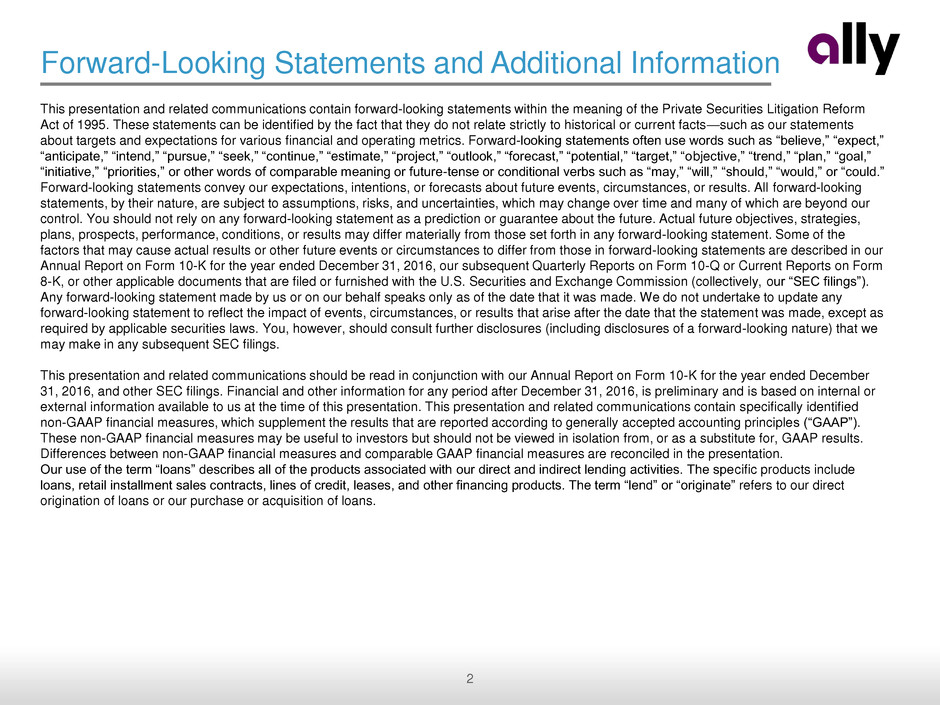
2
Forward-Looking Statements and Additional Information
This presentation and related communications contain forward-looking statements within the meaning of the Private Securities Litigation Reform
Act of 1995. These statements can be identified by the fact that they do not relate strictly to historical or current facts—such as our statements
about targets and expectations for various financial and operating metrics. Forward-looking statements often use words such as “believe,” “expect,”
“anticipate,” “intend,” “pursue,” “seek,” “continue,” “estimate,” “project,” “outlook,” “forecast,” “potential,” “target,” “objective,” “trend,” “plan,” “goal,”
“initiative,” “priorities,” or other words of comparable meaning or future-tense or conditional verbs such as “may,” “will,” “should,” “would,” or “could.”
Forward-looking statements convey our expectations, intentions, or forecasts about future events, circumstances, or results. All forward-looking
statements, by their nature, are subject to assumptions, risks, and uncertainties, which may change over time and many of which are beyond our
control. You should not rely on any forward-looking statement as a prediction or guarantee about the future. Actual future objectives, strategies,
plans, prospects, performance, conditions, or results may differ materially from those set forth in any forward-looking statement. Some of the
factors that may cause actual results or other future events or circumstances to differ from those in forward-looking statements are described in our
Annual Report on Form 10-K for the year ended December 31, 2016, our subsequent Quarterly Reports on Form 10-Q or Current Reports on Form
8-K, or other applicable documents that are filed or furnished with the U.S. Securities and Exchange Commission (collectively, our “SEC filings”).
Any forward-looking statement made by us or on our behalf speaks only as of the date that it was made. We do not undertake to update any
forward-looking statement to reflect the impact of events, circumstances, or results that arise after the date that the statement was made, except as
required by applicable securities laws. You, however, should consult further disclosures (including disclosures of a forward-looking nature) that we
may make in any subsequent SEC filings.
This presentation and related communications should be read in conjunction with our Annual Report on Form 10-K for the year ended December
31, 2016, and other SEC filings. Financial and other information for any period after December 31, 2016, is preliminary and is based on internal or
external information available to us at the time of this presentation. This presentation and related communications contain specifically identified
non-GAAP financial measures, which supplement the results that are reported according to generally accepted accounting principles (“GAAP”).
These non-GAAP financial measures may be useful to investors but should not be viewed in isolation from, or as a substitute for, GAAP results.
Differences between non-GAAP financial measures and comparable GAAP financial measures are reconciled in the presentation.
Our use of the term “loans” describes all of the products associated with our direct and indirect lending activities. The specific products include
loans, retail installment sales contracts, lines of credit, leases, and other financing products. The term “lend” or “originate” refers to our direct
origination of loans or our purchase or acquisition of loans.
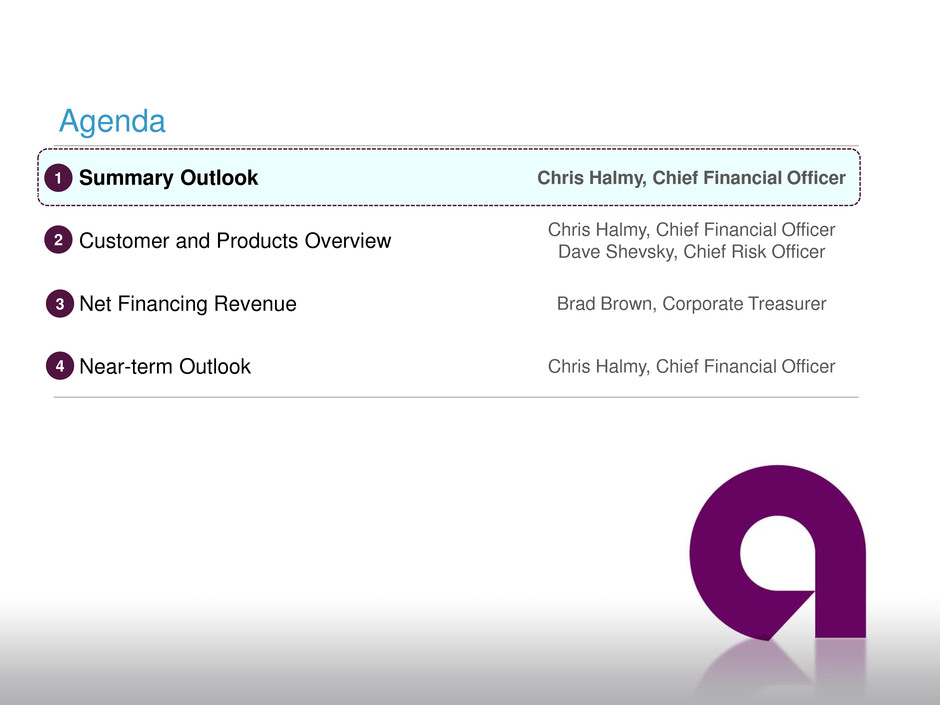
3 CONFIDENTIAL
Summary Outlook Chris Halmy, Chief Financial Officer
Customer and Products Overview
Chris Halmy, Chief Financial Officer
Dave Shevsky, Chief Risk Officer
Net Financing Revenue Brad Brown, Corporate Treasurer
Near-term Outlook Chris Halmy, Chief Financial Officer
1
2
3
4
Agenda
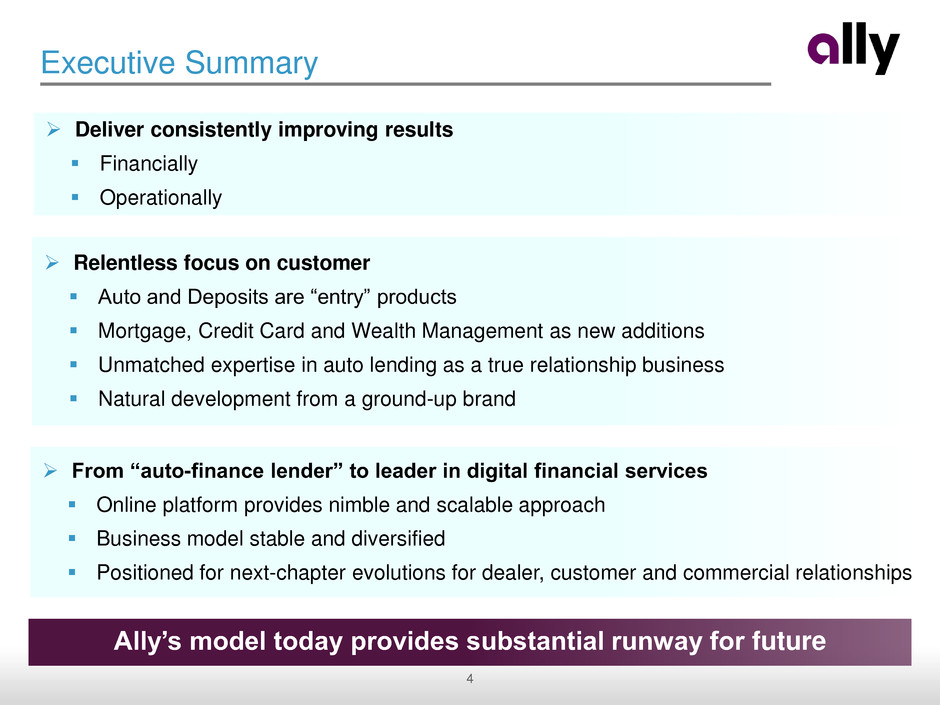
4
Executive Summary
Deliver consistently improving results
Financially
Operationally
Relentless focus on customer
Auto and Deposits are “entry” products
Mortgage, Credit Card and Wealth Management as new additions
Unmatched expertise in auto lending as a true relationship business
Natural development from a ground-up brand
Ally’s model today provides substantial runway for future
From “auto-finance lender” to leader in digital financial services
Online platform provides nimble and scalable approach
Business model stable and diversified
Positioned for next-chapter evolutions for dealer, customer and commercial relationships
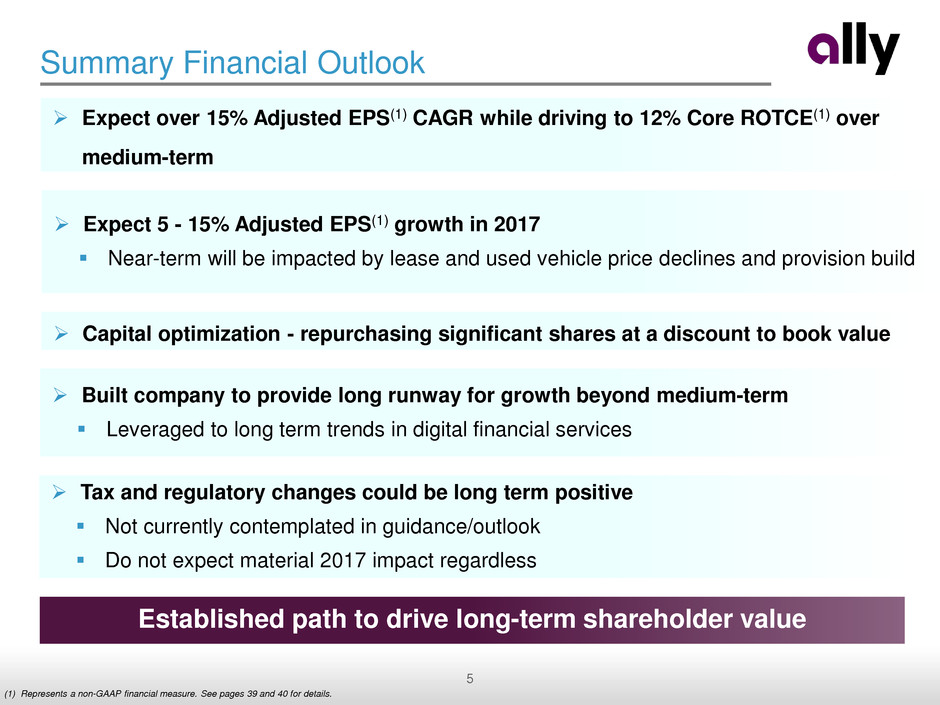
5
Summary Financial Outlook
(1) Represents a non-GAAP financial measure. See pages 39 and 40 for details.
Expect over 15% Adjusted EPS(1) CAGR while driving to 12% Core ROTCE(1) over
medium-term
Expect 5 - 15% Adjusted EPS(1) growth in 2017
Near-term will be impacted by lease and used vehicle price declines and provision build
Capital optimization - repurchasing significant shares at a discount to book value
Built company to provide long runway for growth beyond medium-term
Leveraged to long term trends in digital financial services
Established path to drive long-term shareholder value
Tax and regulatory changes could be long term positive
Not currently contemplated in guidance/outlook
Do not expect material 2017 impact regardless
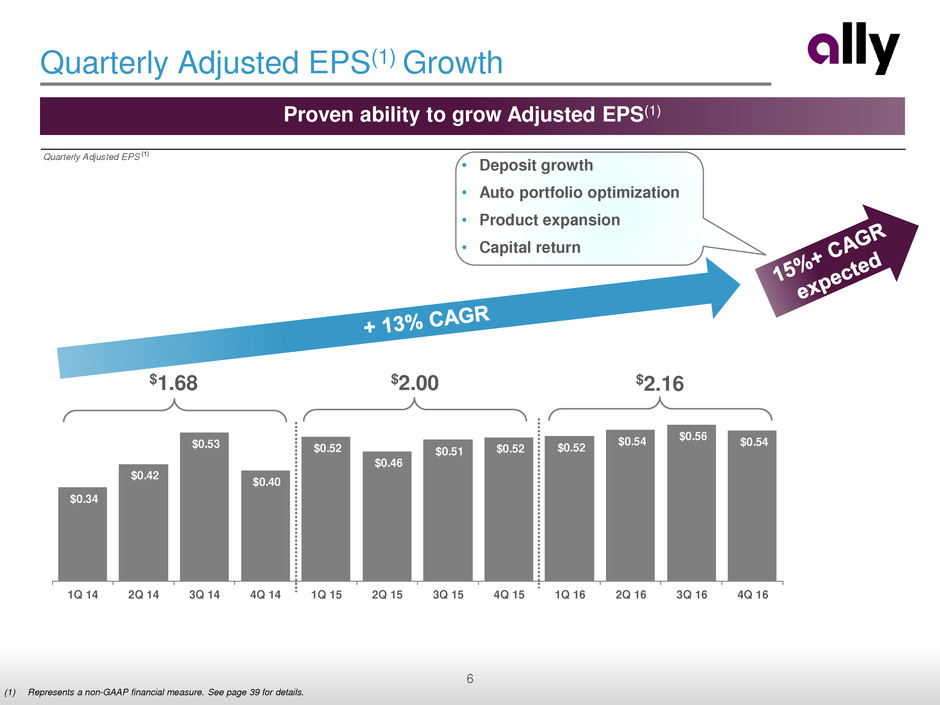
6
Quarterly Adjusted EPS (1)
$0.34
$0.42
$0.53
$0.40
$0.52
$0.46
$0.51 $0.52 $0.52
$0.54 $0.56 $0.54
1Q 14 2Q 14 3Q 14 4Q 14 1Q 15 2Q 15 3Q 15 4Q 15 1Q 16 2Q 16 3Q 16 4Q 16
Quarterly Adjusted EPS(1) Growth
(1) Represents a non-GAAP financial measure. See page 39 for details.
$1.68 $2.00 $2.16
• Deposit growth
• Auto portfolio optimization
• Product expansion
• Capital return
Proven ability to grow Adjusted EPS(1)
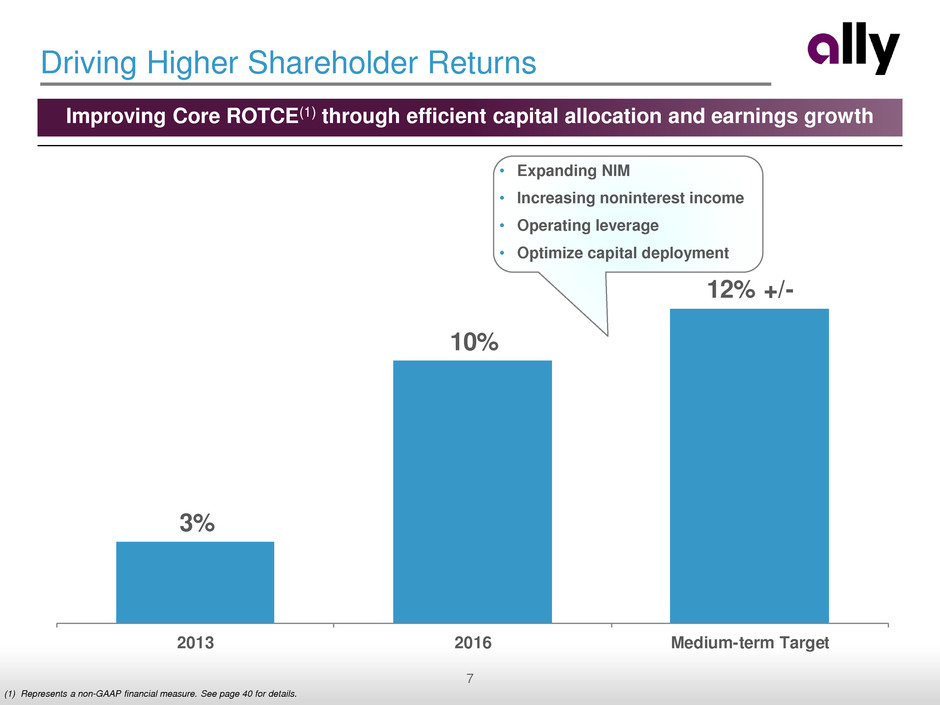
7
Driving Higher Shareholder Returns
(1) Represents a non-GAAP financial measure. See page 40 for details.
Improving Core ROTCE(1) through efficient capital allocation and earnings growth
• Expanding NIM
• Increasing noninterest income
• Operating leverage
• Optimize capital deployment
3%
10%
12% +/-
2013 2016 Medium-term Target
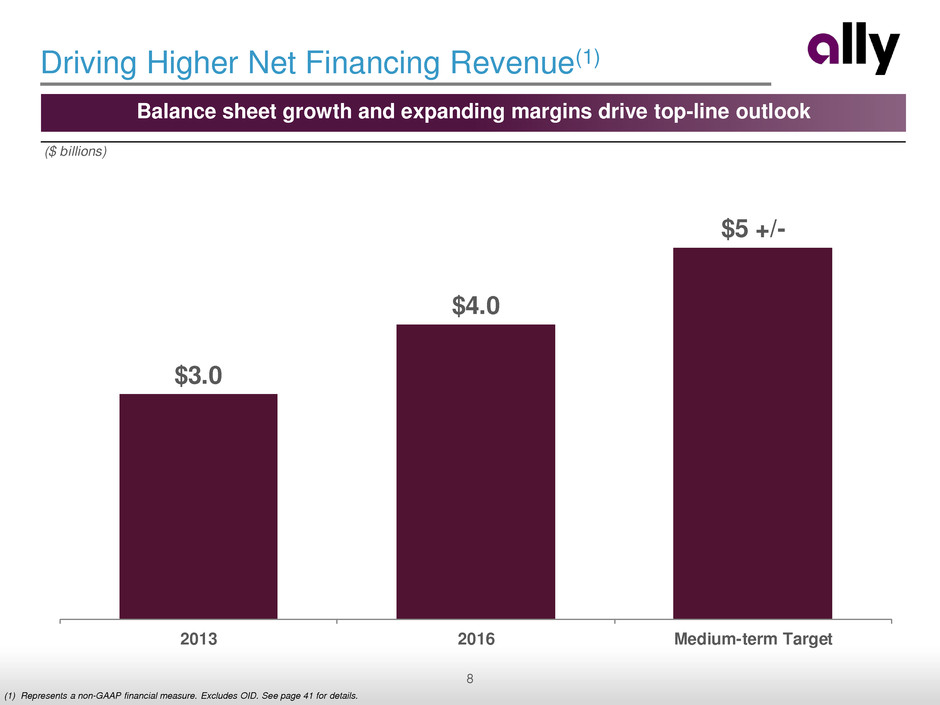
8
Driving Higher Net Financing Revenue(1)
Balance sheet growth and expanding margins drive top-line outlook
(1) Represents a non-GAAP financial measure. Excludes OID. See page 41 for details.
($ billions)
$3.0
$4.0
$5 +/-
2013 2016 Medium-term Target
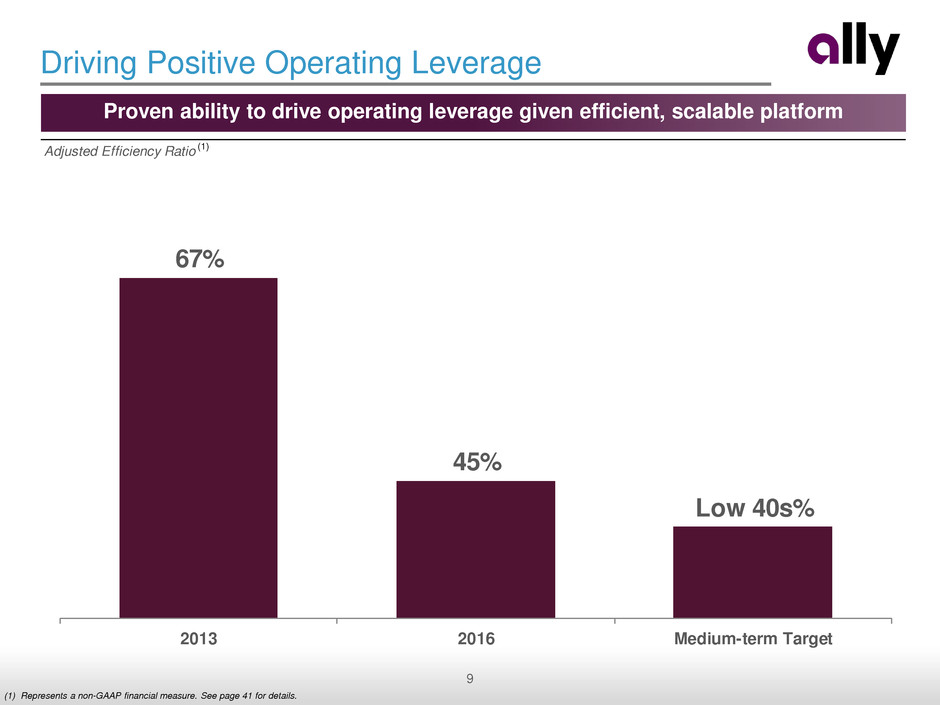
9
Driving Positive Operating Leverage
Proven ability to drive operating leverage given efficient, scalable platform
(1) Represents a non-GAAP financial measure. See page 41 for details.
Adjusted Efficiency Ratio (1)
67%
45%
Low 40s%
2013 2016 Medium-term Target

10 CONFIDENTIAL
Summary Outlook Chris Halmy, Chief Financial Officer
Customer and Products Overview
Chris Halmy, Chief Financial Officer
Dave Shevsky, Chief Risk Officer
Net Financing Revenue Brad Brown, Corporate Treasurer
Near-term Outlook Chris Halmy, Chief Financial Officer
1
2
3
4
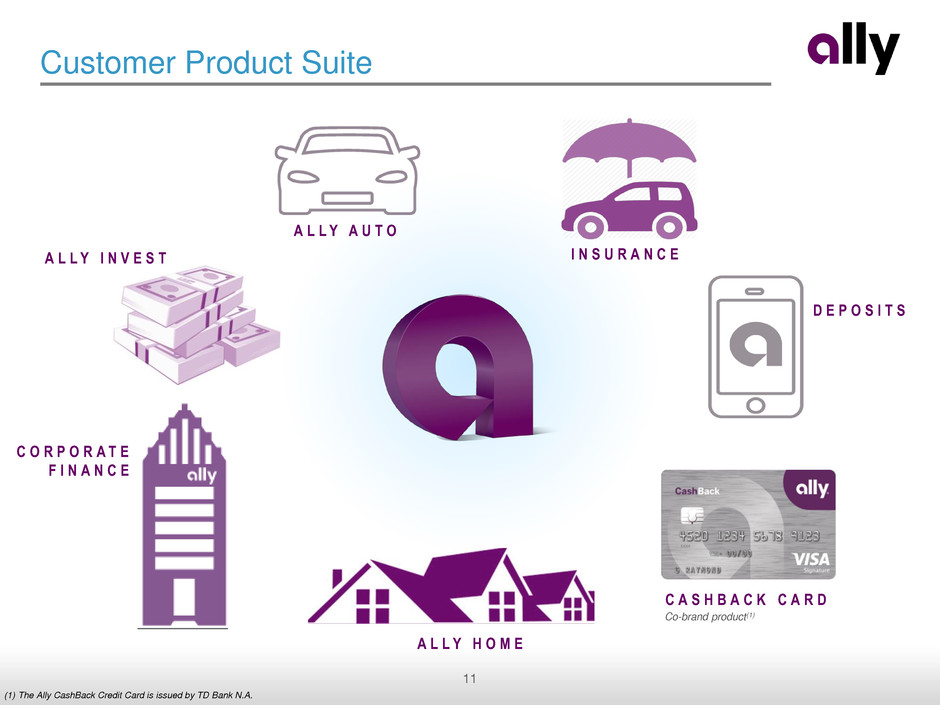
11
Customer Product Suite
(1) The Ally CashBack Credit Card is issued by TD Bank N.A.
A L L Y A U T O
I N S U R A N C E
Co-brand product(1)
C A S H B A C K C A R D
A L L Y H O M E
D E P O S I T S
C O R P O R A T E
F I N A N C E
A L L Y I N V E S T

12
Customer Growth Through Brand and New Offerings
Consumer
Auto
Retail
Deposit
Wealth
Management
Other
(includes Credit Card,
Mortgage)
Commercial
Auto
4.4
million customers
18
thousand dealer relationships
1.2
million customers
250
thousand customers
Note: primary, active customers based on period-end 2016
(1) Year-end 2016, monthly online survey by Hansa, a market research firm, on behalf of Ally – consumers age 35+ with household income of $75K+ and open to working with online banks.
• Stable as retail offsets
lease
• Large, diversified
dealer clients
• 4k commercial loan
relationships
• Strong, steady growth
• 18% CAGR 2010 –
2016
~50
thousand customers
• Growth opportunities
as products marketed
under Ally brand
+ Deepening
existing
relationships
+ New offerings
+ Growing
brand
awareness
=
Positioned to
deliver steady
customer growth
Brand
Awareness(1) 57% • Up from 45% in 2014
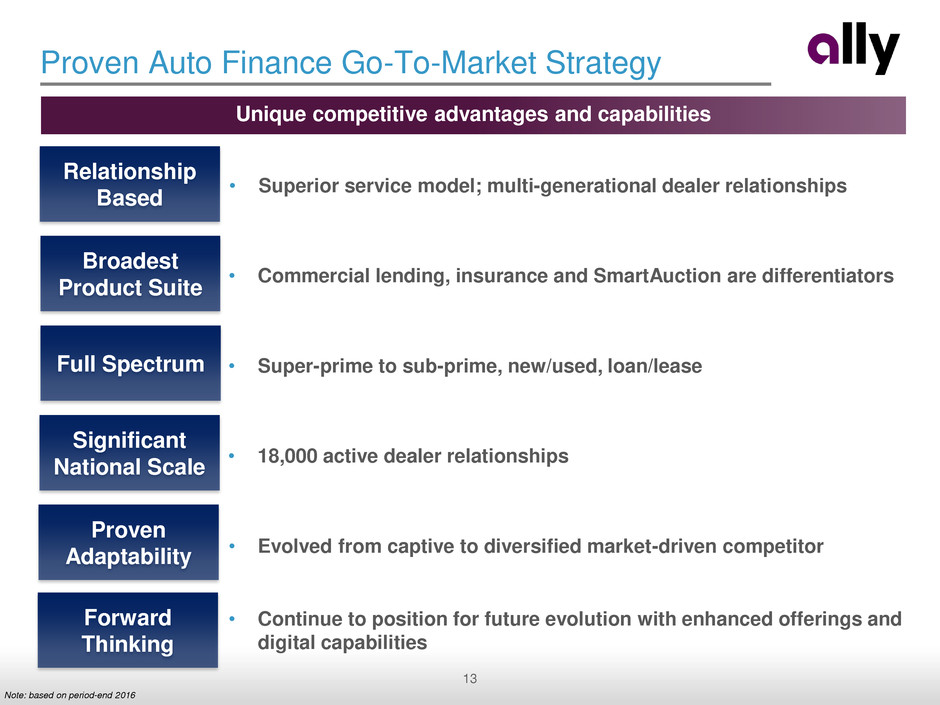
13
Proven Auto Finance Go-To-Market Strategy
Note: based on period-end 2016
Unique competitive advantages and capabilities
• Superior service model; multi-generational dealer relationships
Relationship
Based
Broadest
Product Suite
Full Spectrum
• Commercial lending, insurance and SmartAuction are differentiators
• Super-prime to sub-prime, new/used, loan/lease
Significant
National Scale
• 18,000 active dealer relationships
Proven
Adaptability
• Evolved from captive to diversified market-driven competitor
Forward
Thinking
• Continue to position for future evolution with enhanced offerings and
digital capabilities
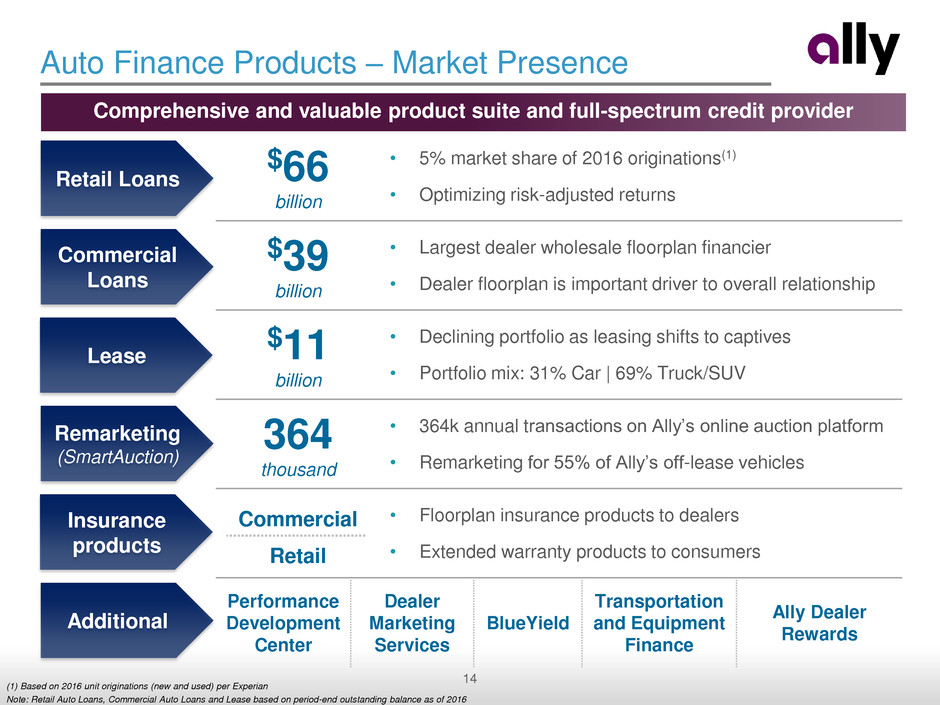
14
Auto Finance Products – Market Presence
Comprehensive and valuable product suite and full-spectrum credit provider
Theme:
Retail Loans
Commercial
Loans
Lease
Remarketing
(SmartAuction)
Insurance
products
$66
billion
• 5% market share of 2016 originations(1)
• Optimizing risk-adjusted returns
$39
billion
• Largest dealer wholesale floorplan financier
• Dealer floorplan is important driver to overall relationship
$11
billion
• Declining portfolio as leasing shifts to captives
• Portfolio mix: 31% Car | 69% Truck/SUV
364
thousand
• 364k annual transactions on Ally’s online auction platform
• Remarketing for 55% of Ally’s off-lease vehicles
Commercial
Retail
• Floorplan insurance products to dealers
• Extended warranty products to consumers
Performance
Development
Center
Dealer
Marketing
Services
BlueYield
Transportation
and Equipment
Finance
Ally Dealer
Rewards
Additional
(1) Based on 2016 unit originations (new and used) per Experian
Note: Retail Auto Loans, Commercial Auto Loans and Lease based on period-end outstanding balance as of 2016
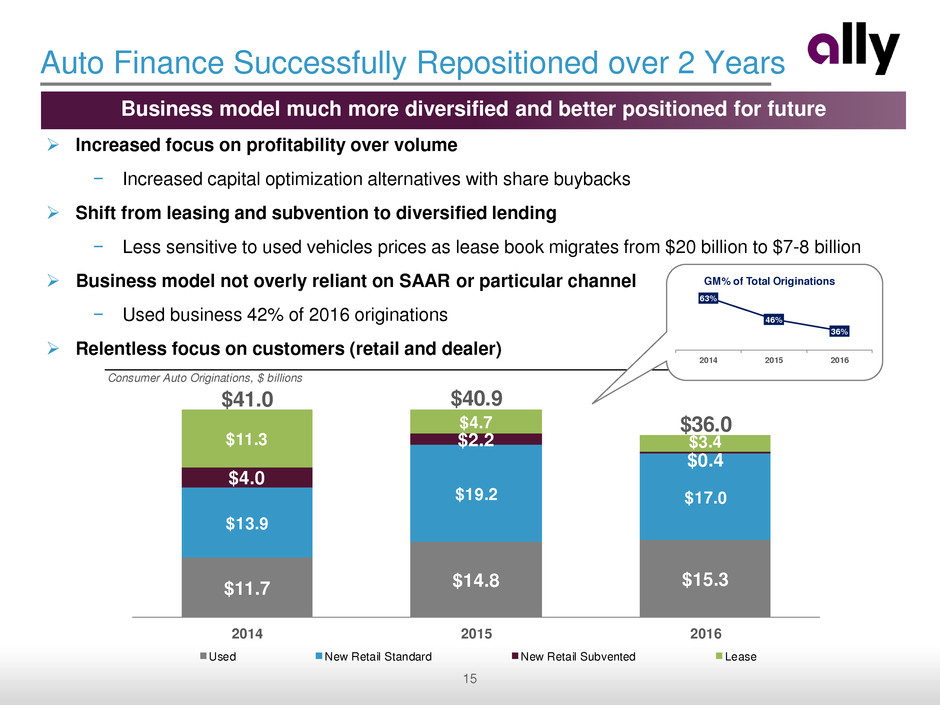
15
Consumer Auto Originations, $ billions
$11.7 $14.8 $15.3
$13.9
$19.2 $17.0
$4.0
$2.2
$0.4
$11.3
$4.7
$3.4
$41.0 $40.9
$36.0
2014 2015 2016
Used New Retail Standard New Retail Subvented Lease
Auto Finance Successfully Repositioned over 2 Years
Increased focus on profitability over volume
− Increased capital optimization alternatives with share buybacks
Shift from leasing and subvention to diversified lending
− Less sensitive to used vehicles prices as lease book migrates from $20 billion to $7-8 billion
Business model not overly reliant on SAAR or particular channel
− Used business 42% of 2016 originations
Relentless focus on customers (retail and dealer)
Business model much more diversified and better positioned for future
63%
46%
36%
2014 2015 2016
GM% of Total Originations

16
Auto Finance Market Update
Auto lenders, including Ally, continue to respond to market trends
− Higher interest rates and interest rate expectations
− Consumer credit losses continue to migrate higher, particularly in lower credit tiers
− Declining used vehicle prices
− Increasing manufacturer incentive levels
− Many captive arms of manufacturers continue to increase leasing presence
Several banks, including Ally, are closely monitoring credit trends and adjusting pricing and/or
underwriting
− Noticeable shift over past few months
− Market generally exhibiting price and risk discipline
− Short dated asset allows for continual repricing of portfolio
We continue to see attractive risk-adjusted return opportunities and expect portfolio profitability to
further improve
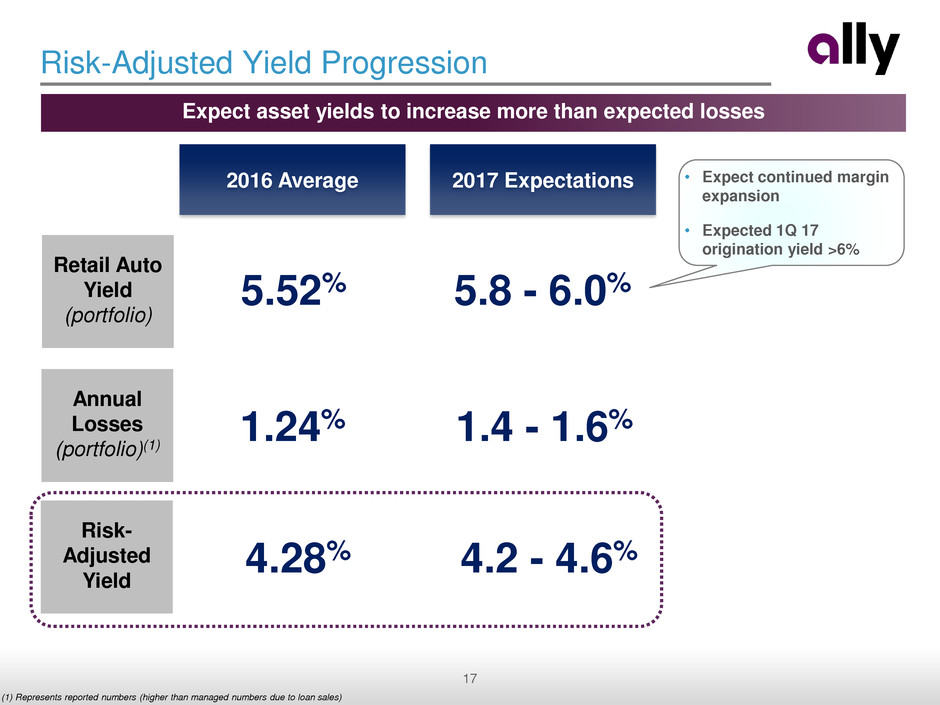
17
Risk-Adjusted Yield Progression
Expect asset yields to increase more than expected losses
2016 Average 2017 Expectations
Retail Auto
Yield
(portfolio)
Annual
Losses
(portfolio)(1)
Risk-
Adjusted
Yield
5.52% 5.8 - 6.0%
1.24% 1.4 - 1.6%
4.28% 4.2 - 4.6%
(1) Represents reported numbers (higher than managed numbers due to loan sales)
• Expect continued margin
expansion
• Expected 1Q 17
origination yield >6%
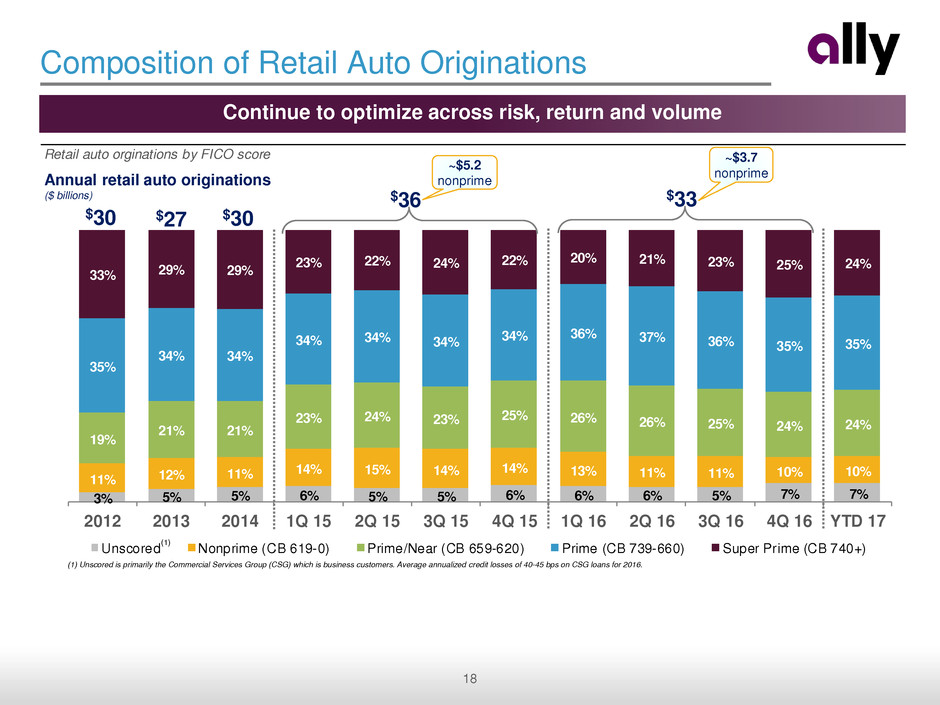
18
Retail auto orginations by FICO score
3% 5% 5% 6% 5% 5% 6% 6% 6% 5% 7% 7%
11% 12% 11%
14% 15% 14% 14% 13% 11% 11% 10% 10%
19%
21% 21%
23% 24% 23% 25% 26% 26% 25% 24% 24%
35%
34% 34%
34% 34% 34% 34%
36% 37% 36% 35% 35%
33% 29% 29%
23% 22% 24% 22% 20% 21% 23% 25% 24%
2012 2013 2014 1Q 15 2Q 15 3Q 15 4Q 15 1Q 16 2Q 16 3Q 16 4Q 16 YTD 17
Unscored Nonprime (CB 619-0) Prime/Near (CB 659-620) Prime (CB 739-660) Super Prime (CB 740+)
Composition of Retail Auto Originations
Continue to optimize across risk, return and volume
Annual retail auto originations
($ billions)
$30 $27 $30
$36 $33
~$5.2
nonprime
~$3.7
nonprime
(1) Unscored is primarily the Commercial Services Group (CSG) which is business customers. Average annualized credit losses of 40-45 bps on CSG loans for 2016.
(1)
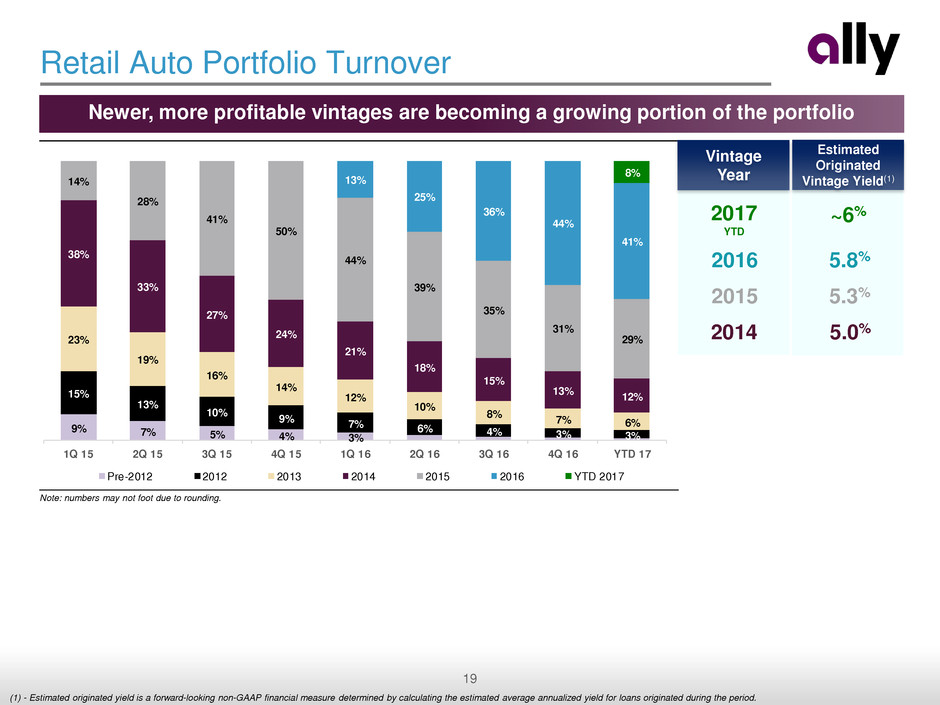
19
9% 7% 5% 4% 3%
15%
13%
10%
9% 7% 6% 4% 3% 3%
23%
19%
16%
14%
12%
10%
8%
7% 6%
38%
33%
27%
24%
21%
18%
15%
13%
12%
14%
28%
41%
50%
44%
39%
35%
31%
29%
13%
25%
36%
44%
41%
8%
1Q 15 2Q 15 3Q 15 4Q 15 1Q 16 2Q 16 3Q 16 4Q 16 YTD 17
Pre-2012 2012 2013 2014 2015 2016 YTD 2017
Retail Auto Portfolio Turnover
Newer, more profitable vintages are becoming a growing portion of the portfolio
Estimated
Originated
Vintage Yield(1)
~6%
Vintage
Year
2017
YTD
5.8% 2016
5.3% 2015
5.0% 2014
(1) - Estimated originated yield is a forward-looking non-GAAP financial measure determined by calculating the estimated average annualized yield for loans originated during the period.
Note: numbers may not foot due to rounding.
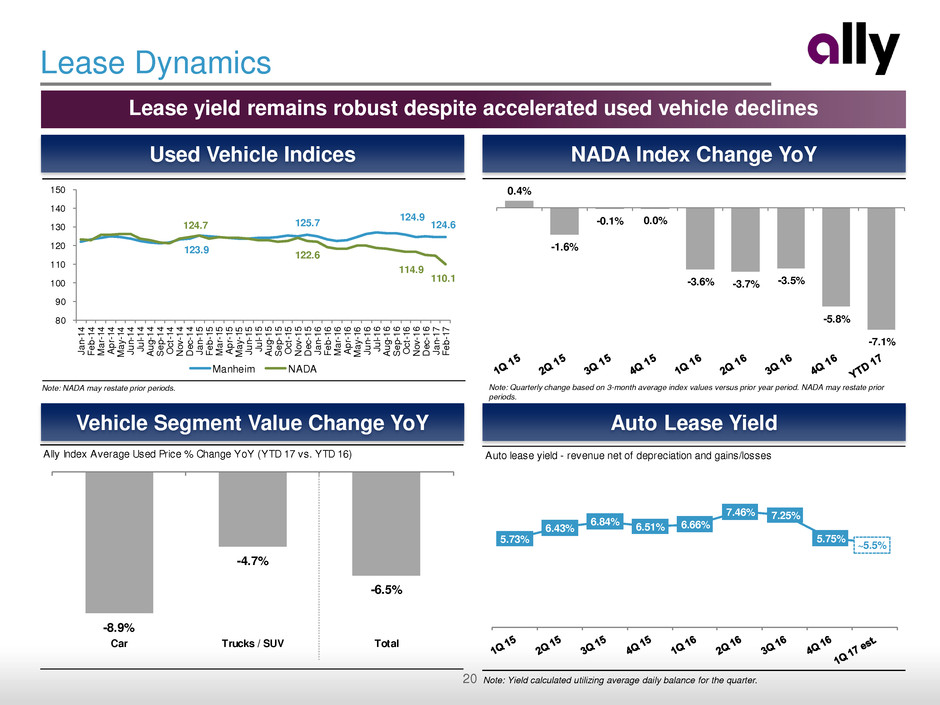
20
0.4%
-1.6%
-0.1% 0.0%
-3.6% -3.7% -3.5%
-5.8%
-7.1%
Ally Index Average Used Price % Change YoY (YTD 17 vs. YTD 16)
-8.9%
-4.7%
-6.5%
Car Trucks / SUV Total
Lease Dynamics
Vehicle Segment Value Change YoY Auto Lease Yield
Used Vehicle Indices NADA Index Change YoY
Lease yield remains robust despite accelerated used vehicle declines
Note: Quarterly change based on 3-month average index values versus prior year period. NADA may restate prior
periods.
Note: Yield calculated utilizing average daily balance for the quarter.
Auto lease yield - revenue net of depreciation and gains/losses
5.73%
6.43%
6.84%
6.51% 6.66%
7.46% 7.25%
5.75%
~5.5%
Note: NADA may restate prior periods.
123.9
125.7
124.9
124.6 124.7
122.6
114.9
110.1
80
90
100
110
120
130
140
150
Ja
n-1
4
Fe
b-1
4
Ma
r-1
4
Ap
r-1
4
Ma
y-1
4
Ju
n-1
4
Ju
l-1
4
Au
g-1
4
Se
p-1
4
Oc
t-1
4
No
v-1
4
De
c-1
4
Ja
n-1
5
Fe
b-1
5
Ma
r-1
5
Ap
r-1
5
Ma
y-1
5
Ju
n-1
5
Ju
l-1
5
Au
g-1
5
Se
p-1
5
Oc
t-1
5
No
v-1
5
De
c-1
5
Ja
n-1
6
Fe
b-1
6
Ma
r-1
6
Ap
r-1
6
Ma
y-1
6
Ju
n-1
6
Ju
l-1
6
Au
g-1
6
Se
p-1
6
Oc
t-1
6
No
v-1
6
De
c-1
6
Ja
n-1
7
Fe
b-1
7
Manheim NADA
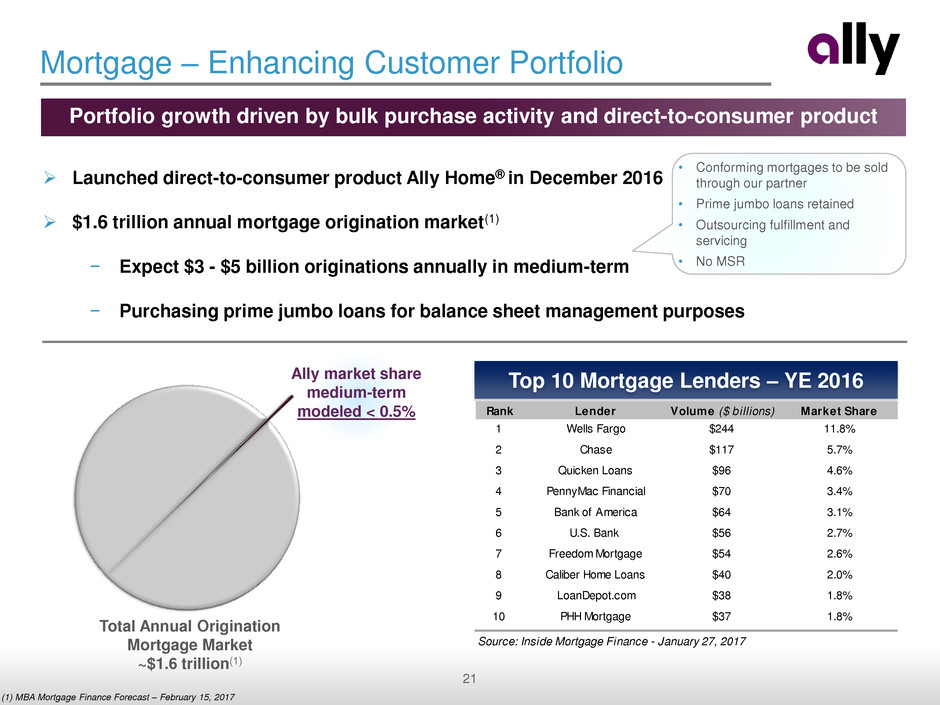
21
Ally Hom
e
Total M
ortgage M
arket
Mortgage – Enhancing Customer Portfolio
Portfolio growth driven by bulk purchase activity and direct-to-consumer product
Launched direct-to-consumer product Ally Home® in December 2016
$1.6 trillion annual mortgage origination market(1)
− Expect $3 - $5 billion originations annually in medium-term
− Purchasing prime jumbo loans for balance sheet management purposes
Ally market share
medium-term
modeled < 0.5%
Total Annual Origination
Mortgage Market
~$1.6 trillion(1)
Top 10 Mortgage Lenders – YE 2016
Rank Lender Volume ($ billions) Market Share
1 Wells Fargo $244 11.8%
2 Chase $117 5.7%
3 Quicken Loans $96 4.6%
4 PennyMac Financial $70 3.4%
5 Bank of America $64 3.1%
6 U.S. Bank $56 2.7%
7 Freedom Mortgage $54 2.6%
8 Caliber Home Loans $40 2.0%
9 LoanDepot.com $38 1.8%
10 PHH Mortgage $37 1.8%
Source: Inside Mortgage Finance - January 27, 2017
(1) MBA Mortgage Finance Forecast – February 15, 2017
• Conforming mortgages to be sold
through our partner
• Prime jumbo loans retained
• Outsourcing fulfillment and
servicing
• No MSR

22
Ally Invest – Enhancing Customer Portfolio
Natural combination of digital, self-directed savings and investing
Self-Directed Trading
For the hands-on investor
Ally Managed Portfolios
Automated investing, professionally managed
Low fees
Variety of investment products
In-depth research tools
24/7 customer service
Current 2020 est.
Online
Brokerage(1)
$5.7
trillion
$7.0+
trillion
(1) Source: Cerulli 2015 Retail and Advice Report
Digitally
Managed
Portfolios(1)
$50
billion
$489
billion
Large and growing addressable market
NIM Benefits
Benefit from growing
customer sweep deposits
Online Brokerage
Digitally Managed
Portfolios
Commission growth
driving noninterest
income
Asset management fee
growth
“3-channel” revenue growth

23
Corporate Finance
Senior secured leveraged cash flow and asset-based loans to middle market companies
Experienced management team and business joined Ally in 1999
− Highly regarded market participant backed by a stable source of capital
− Reputation for speed, certainty and reliability throughout the loan life cycle
− Higher ROE specialized lending business with low historical loss rate
Private equity sponsored middle-market leveraged lending landscape is highly fragmented
Product line breadth
Speed of execution
Relationship orientation
Certainty of delivery
Industry and product specialization
Strong risk management
Reputation as “cycle tested” & “steady handed”
Go-To-Market Strategy Niche business positioned to grow
• $3.2 billion outstandings(1) - expected to
grow to $6-7 billion by 2019
• Typical deal transaction $25-$250 million
− Larger commercial banks usually
compete in $500+ million deal market
− Ally deposit funding advantage over
wholesale funded specialty lenders
• Growing teams in technology and healthcare
space
(1) Outstandings as of year-end 2016

24
Total deposits; $ billions
$35
$41
$48
$53
$58
$66
$79
$115 +
2010 2011 2012 2013 2014 2015 2016 2017 est. 2018 est. 2019 est.
Deposit Growth as Value Driver & Customer Acquirer
Deposit growth a meaningful driver of franchise value over time
Growth from:
• Existing retail customers
• New retail customers
• Ally Invest sweep deposits
• Brokered
Note: Domestic deposits for all periods.
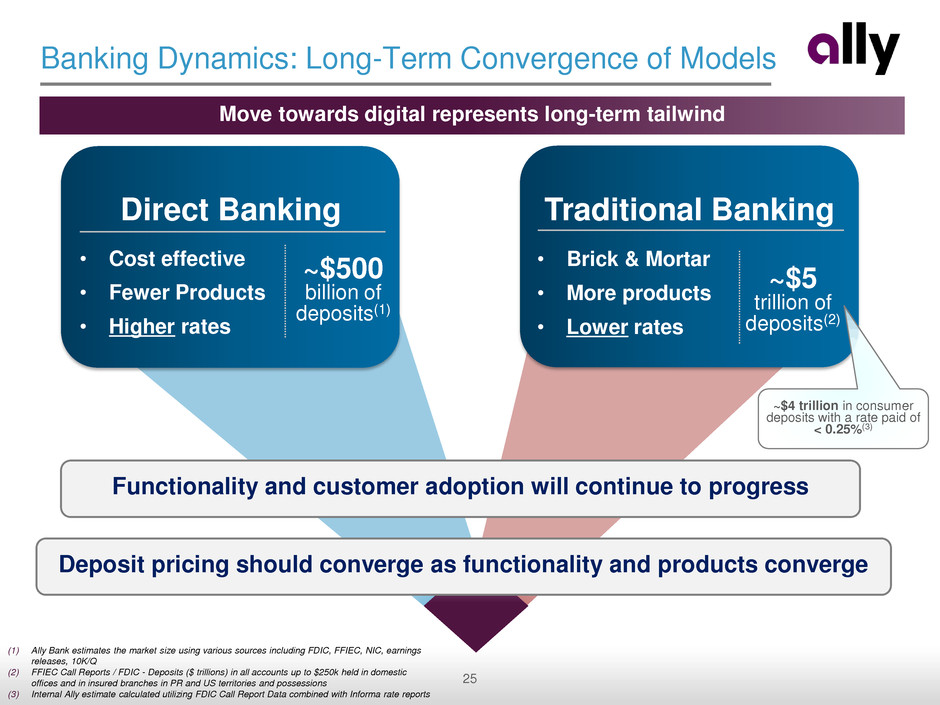
25
Banking Dynamics: Long-Term Convergence of Models
Direct Banking
• Cost effective
• Fewer Products
• Higher rates
~$500
billion of
deposits(1)
Traditional Banking
• Brick & Mortar
• More products
• Lower rates
~$5
trillion of
deposits(2)
Functionality and customer adoption will continue to progress
Deposit pricing should converge as functionality and products converge
Move towards digital represents long-term tailwind
~$4 trillion in consumer
deposits with a rate paid of
< 0.25%(3)
(1) Ally Bank estimates the market size using various sources including FDIC, FFIEC, NIC, earnings
releases, 10K/Q
(2) FFIEC Call Reports / FDIC - Deposits ($ trillions) in all accounts up to $250k held in domestic
offices and in insured branches in PR and US territories and possessions
(3) Internal Ally estimate calculated utilizing FDIC Call Report Data combined with Informa rate reports
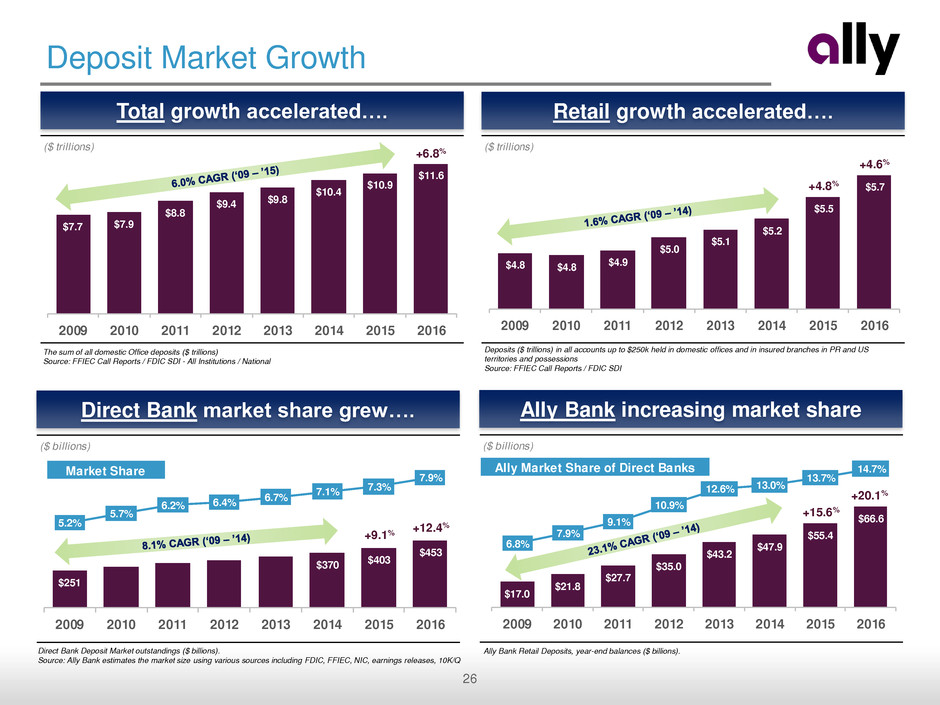
26
($ billions)
$251
$370 $403
$453
5.2%
5.7%
6.2% 6.4%
6.7%
7.1% 7.3%
7.9%
2009 2010 2011 2012 2013 2014 2015 2016
Market Share
($ billions)
$17.0
$21.8
$27.7
$35.0
$43.2
$47.9
$55.4
$66.6
6.8%
7.9%
9.1%
10.9%
12.6% 13.0%
13.7%
14.7%
2009 2010 201 2012 2013 2014 2015 2016
Ally Market Share of Direct Banks
($ trillions)
$4.8 $4.8 $4.9
$5.0
$5.1
$5.2
$5.5
$5.7
2009 2010 2011 20 2 2013 2014 2015 2016
($ trillions)
$7.7 $7.9
$8.8
$9.4 $9.8
$10.4
$10.9
$11.6
2009 2010 2 11 2012 2013 14 5 6
Deposit Market Growth
Total growth accelerated…. Retail growth accelerated….
Direct Bank market share grew…. Ally Bank increasing market share
+6.8%
The sum of all domestic Office deposits ($ trillions)
Source: FFIEC Call Reports / FDIC SDI - All Institutions / National
+4.8%
+4.6%
Deposits ($ trillions) in all accounts up to $250k held in domestic offices and in insured branches in PR and US
territories and possessions
Source: FFIEC Call Reports / FDIC SDI
+9.1%
+12.4%
Direct Bank Deposit Market outstandings ($ billions).
Source: Ally Bank estimates the market size using various sources including FDIC, FFIEC, NIC, earnings releases, 10K/Q
+15.6%
+20.1%
Ally Bank Retail Deposits, year-end balances ($ billions).
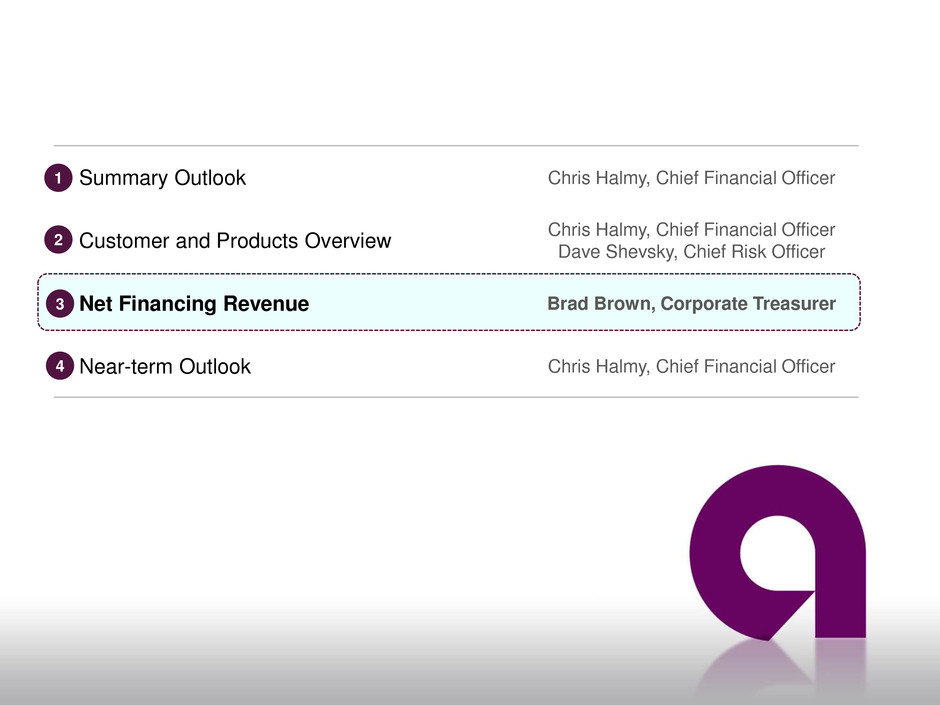
27 CONFIDENTIAL
Summary Outlook Chris Halmy, Chief Financial Officer
Customer and Products Overview
Chris Halmy, Chief Financial Officer
Dave Shevsky, Chief Risk Officer
Net Financing Revenue Brad Brown, Corporate Treasurer
Near-term Outlook Chris Halmy, Chief Financial Officer
1
2
3
4
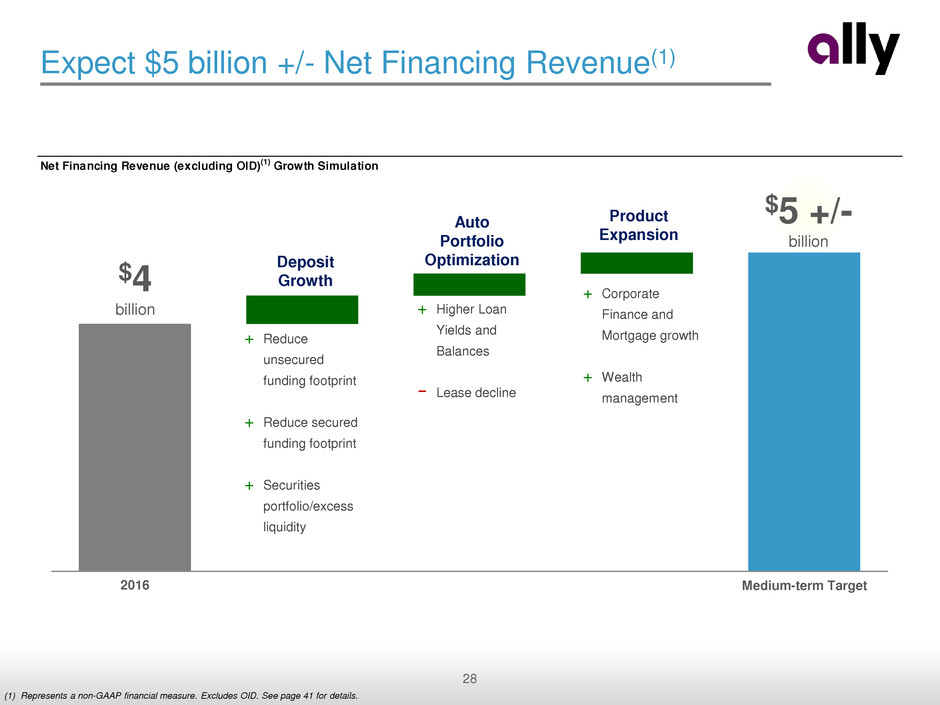
28
Net Financing Revenue (excluding OID)(1) Growth Simulation
(1) Represents a non-GAAP financial measure. Excludes OID. See page 41 for details.
Deposit
Growth
2016 Medium-term Target
Auto
Portfolio
Optimization
Product
Expansion
+ Corporate
Finance and
Mortgage growth
+ Wealth
management
$4
billion
Expect $5 billion +/- Net Financing Revenue(1)
$5 +/-
billion
+ Higher Loan
Yields and
Balances
− Lease decline
+ Reduce
unsecured
funding footprint
+ Reduce secured
funding footprint
+ Securities
portfolio/excess
liquidity
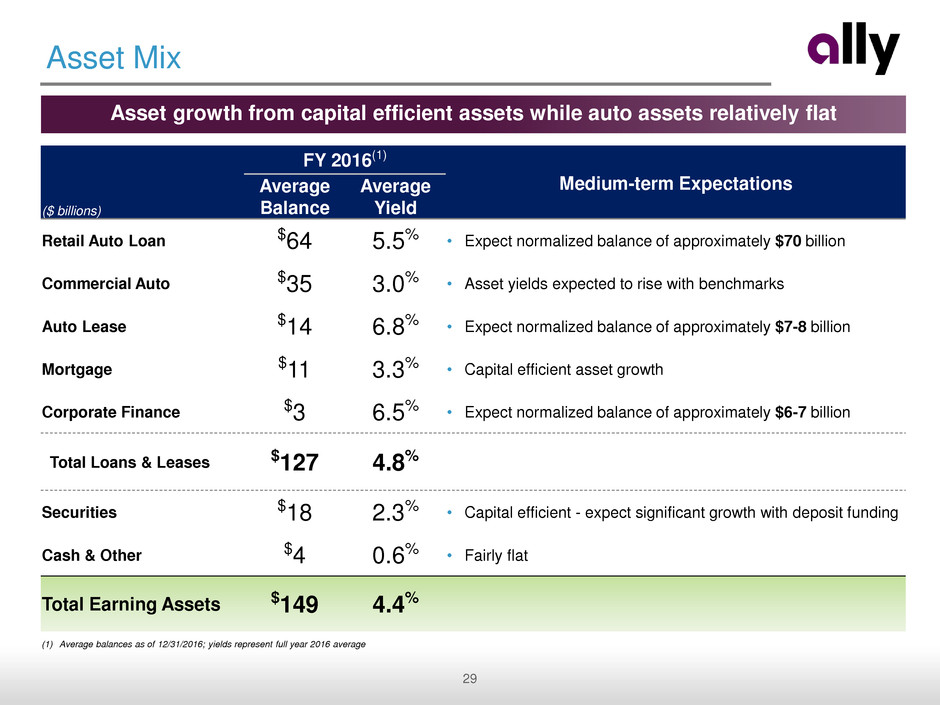
29
Asset Mix
($ billions)
FY 2016(1)
Medium-term Expectations Average
Balance
Average
Yield
Retail Auto Loan $64 5.5% • Expect normalized balance of approximately $70 billion
Commercial Auto $35 3.0% • Asset yields expected to rise with benchmarks
Auto Lease $14 6.8% • Expect normalized balance of approximately $7-8 billion
Mortgage $11 3.3% • Capital efficient asset growth
Corporate Finance $3 6.5% • Expect normalized balance of approximately $6-7 billion
Total Loans & Leases $127 4.8%
Securities $18 2.3% • Capital efficient - expect significant growth with deposit funding
Cash & Other $4 0.6% • Fairly flat
Total Earning Assets $149 4.4%
Asset growth from capital efficient assets while auto assets relatively flat
(1) Average balances as of 12/31/2016; yields represent full year 2016 average
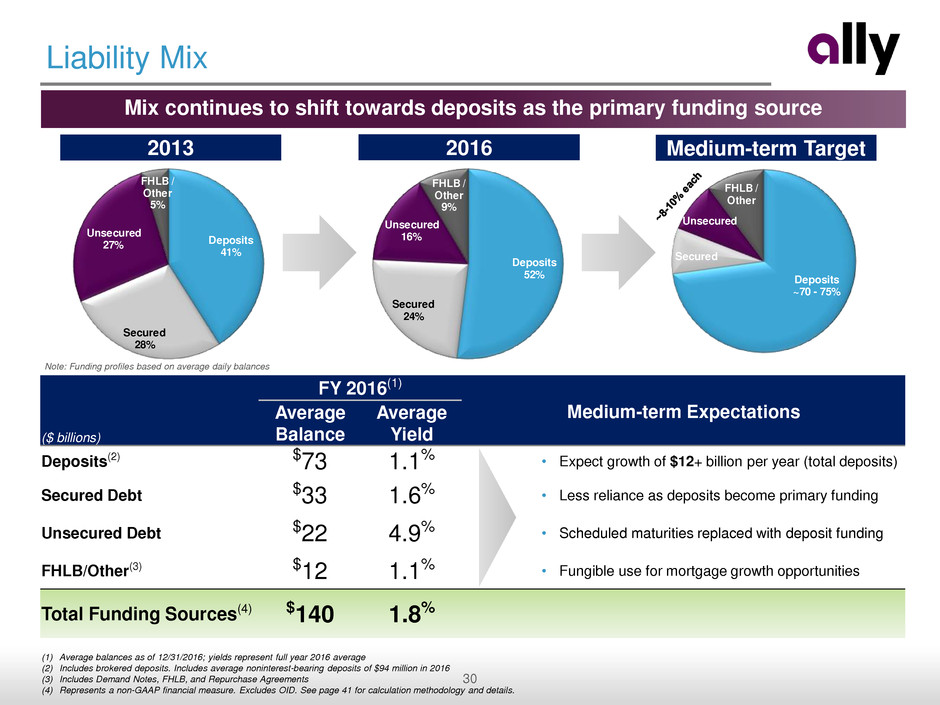
30
Deposits
41%
Secured
28%
Unsecured
27%
FHLB /
Other
5%
Deposits
52%
Secured
24%
Unsecured
16%
FHLB /
Other
9%
Secured
Unsecured
FHLB /
Other
Deposits
~70 - 75%
Liability Mix
($ billions)
FY 2016(1)
Medium-term Expectations Average
Balance
Average
Yield
Deposits(2) $73 1.1% • Expect growth of $12+ billion per year (total deposits)
Secured Debt $33 1.6% • Less reliance as deposits become primary funding
Unsecured Debt $22 4.9% • Scheduled maturities replaced with deposit funding
FHLB/Other(3) $12 1.1% • Fungible use for mortgage growth opportunities
Total Funding Sources(4) $140 1.8%
Mix continues to shift towards deposits as the primary funding source
2013 2016 Medium-term Target
Note: Funding profiles based on average daily balances
(1) Average balances as of 12/31/2016; yields represent full year 2016 average
(2) Includes brokered deposits. Includes average noninterest-bearing deposits of $94 million in 2016
(3) Includes Demand Notes, FHLB, and Repurchase Agreements
(4) Represents a non-GAAP financial measure. Excludes OID. See page 41 for calculation methodology and details.
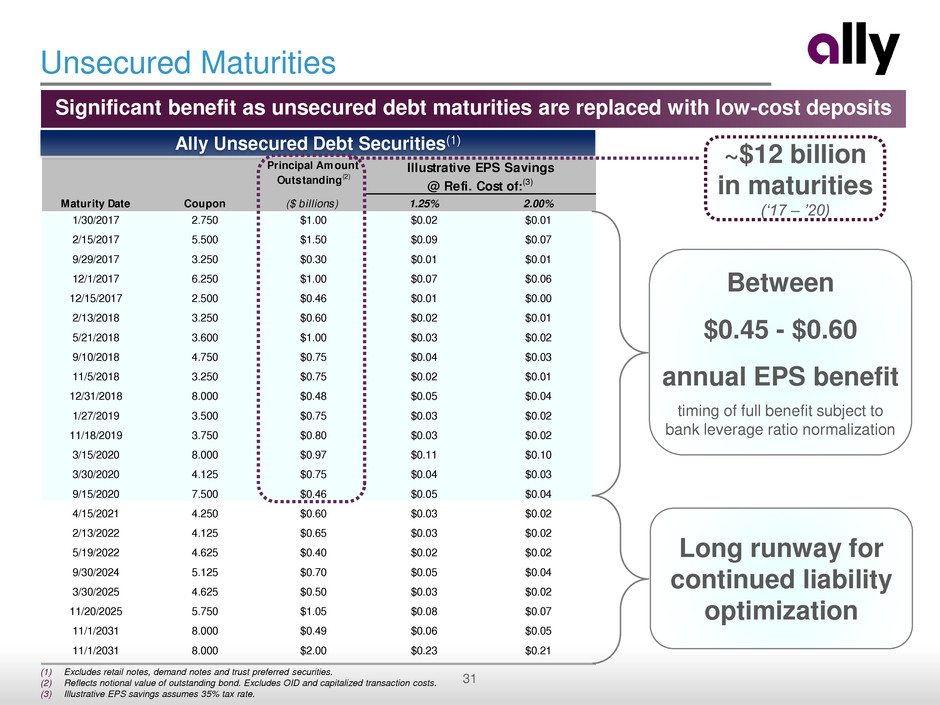
31
Principal Amount
Outstanding(2)
Maturity Date Coupon ($ billions) 1.25% 2.00%
1/30/2017 2.750 $1.00 $0.02 $0.01
2/15/2017 5.500 $1.50 $0.09 $0.07
9/29/2017 3.250 $0.30 $0.01 $0.01
12/1/2017 6.250 $1.00 $0.07 $0.06
12/15/2017 2.500 $0.46 $0.01 $0.00
2/13/2018 3.250 $0.60 $0.02 $0.01
5/21/2018 3.600 $1.00 $0.03 $0.02
9/10/2018 4.750 $0.75 $0.04 $0.03
11/5/2018 3.250 $0.75 $0.02 $0.01
12/31/2018 8.000 $0.48 $0.05 $0.04
1/27/2019 3.500 $0.75 $0.03 $0.02
11/18/2019 3.750 $0.80 $0.03 $0.02
3/15/2020 8.000 $0.97 $0.11 $0.10
3/30/2020 4.125 $0.75 $0.04 $0.03
9/15/2020 7.500 $0.46 $0.05 $0.04
4/15/2021 4.250 $0.60 $0.03 $0.02
2/13/2022 4.125 $0.65 $0.03 $0.02
5/19/2022 4.625 $0.40 $0.02 $0.02
9/30/2024 5.125 $0.70 $0.05 $0.04
3/30/2025 4.625 $0.50 $0.03 $0.02
11/20/2025 5.750 $1.05 $0.08 $0.07
11/1/2031 8.000 $0.49 $0.06 $0.05
11/1/2031 8.000 $2.00 $0.23 $0.21
Illustrative EPS Savings
@ Refi. Cost of:(3)
Unsecured Maturities
Significant benefit as unsecured debt maturities are replaced with low-cost deposits
Ally Unsecured Debt Securities(1)
Between
$0.45 - $0.60
annual EPS benefit
timing of full benefit subject to
bank leverage ratio normalization
Long runway for
continued liability
optimization
~$12 billion
in maturities
(‘17 – ’20)
(1) Excludes retail notes, demand notes and trust preferred securities.
(2) Reflects notional value of outstanding bond. Excludes OID and capitalized transaction costs.
(3) Illustrative EPS savings assumes 35% tax rate.
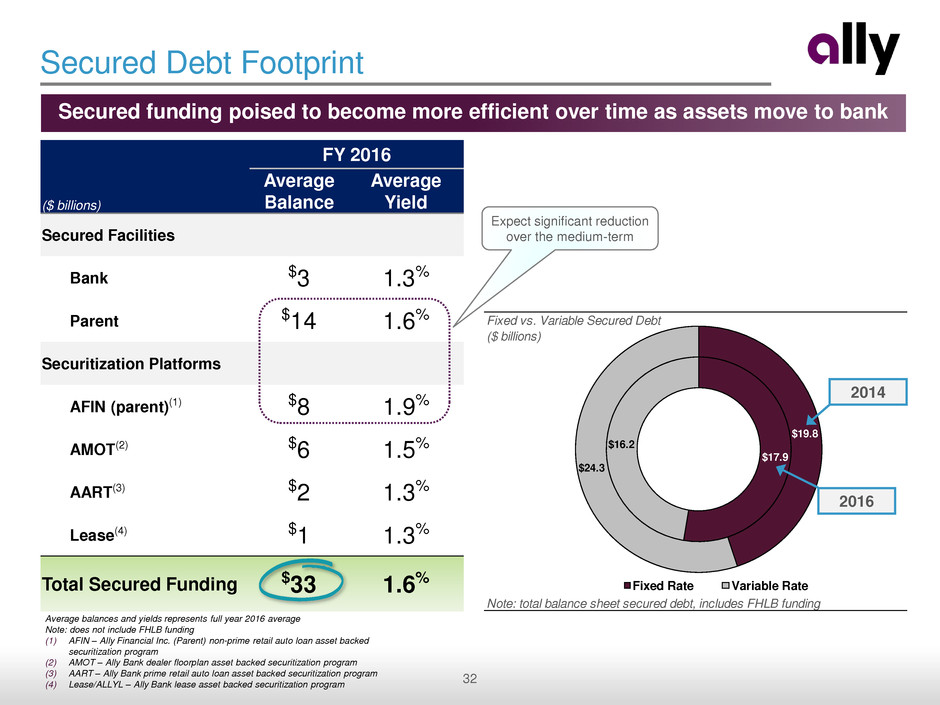
32
Fixed vs. Variable Secured Debt
($ billions)
Note: total balance sheet secured debt, includes FHLB funding
$17.9
$16.2
$19.8
$24.3
Fixed Rate Variable Rate
Secured Debt Footprint
Secured funding poised to become more efficient over time as assets move to bank
($ billions)
FY 2016
Average
Balance
Average
Yield
Secured Facilities
Bank $3 1.3%
Parent $14 1.6%
Securitization Platforms
AFIN (parent)(1) $8 1.9%
AMOT(2) $6 1.5%
AART(3) $2 1.3%
Lease(4) $1 1.3%
Total Secured Funding $33 1.6%
Average balances and yields represents full year 2016 average
Note: does not include FHLB funding
(1) AFIN – Ally Financial Inc. (Parent) non-prime retail auto loan asset backed
securitization program
(2) AMOT – Ally Bank dealer floorplan asset backed securitization program
(3) AART – Ally Bank prime retail auto loan asset backed securitization program
(4) Lease/ALLYL – Ally Bank lease asset backed securitization program
2016
2014
Expect significant reduction
over the medium-term
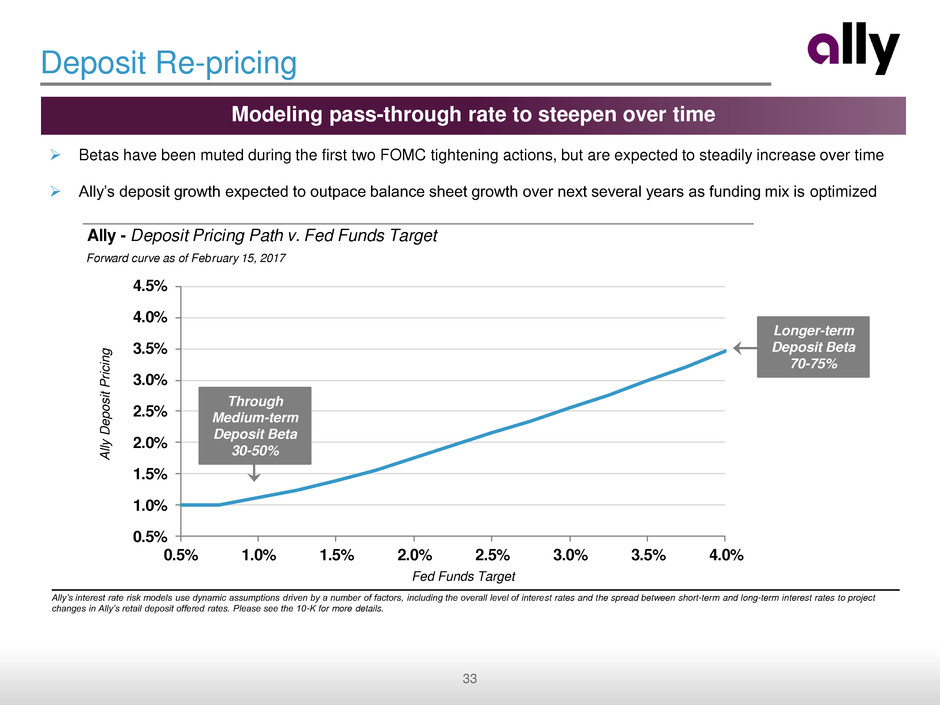
33
Deposit Re-pricing
Modeling pass-through rate to steepen over time
Betas have been muted during the first two FOMC tightening actions, but are expected to steadily increase over time
Ally’s deposit growth expected to outpace balance sheet growth over next several years as funding mix is optimized
Ally - Deposit Pricing Path v. Fed Funds Target
Forward curve as of February 15, 2017
0.5%
1.0%
1.5%
2.0%
2.5%
3.0%
3.5%
4.0%
4.5%
0.5% 1.0% 1.5% 2.0% 2.5% 3.0% 3.5% 4.0%
A
lly
Dep
o
s
it
P
ri
c
in
g
Fed Funds Target
Longer-term
Deposit Beta
70-75%
Through
Medium-term
Deposit Beta
30-50%
Ally’s interest rate risk models use dynamic assumptions driven by a number of factors, including the overall level of interest rates and the spread between short-term and long-term interest rates to project
changes in Ally’s retail deposit offered rates. Please see the 10-K for more details.
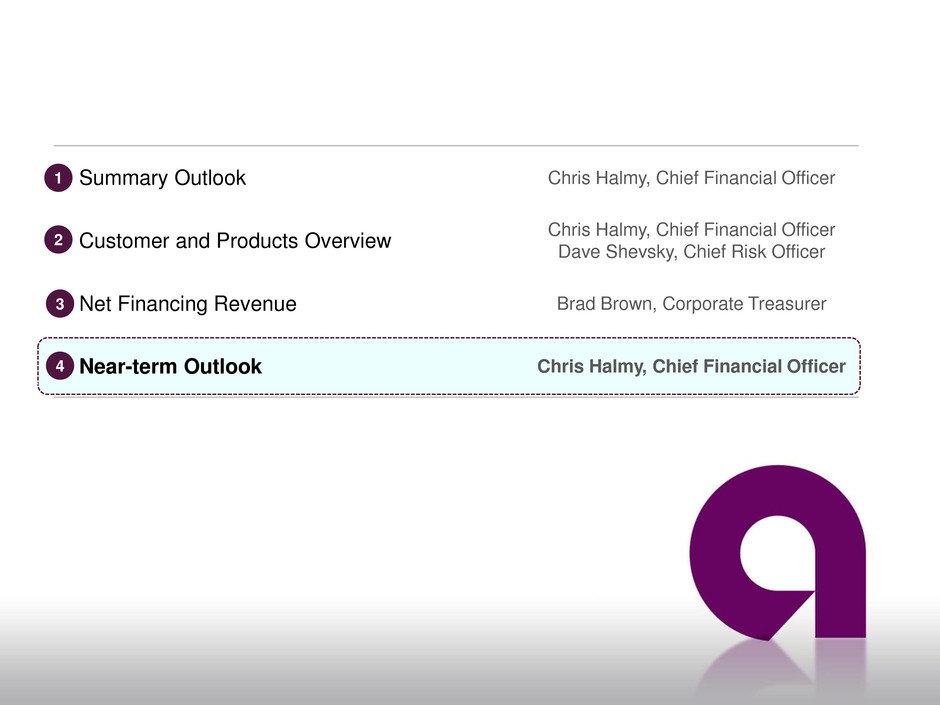
34 CONFIDENTIAL
Summary Outlook Chris Halmy, Chief Financial Officer
Customer and Products Overview
Chris Halmy, Chief Financial Officer
Dave Shevsky, Chief Risk Officer
Net Financing Revenue Brad Brown, Corporate Treasurer
Near-term Outlook Chris Halmy, Chief Financial Officer
1
2
3
4
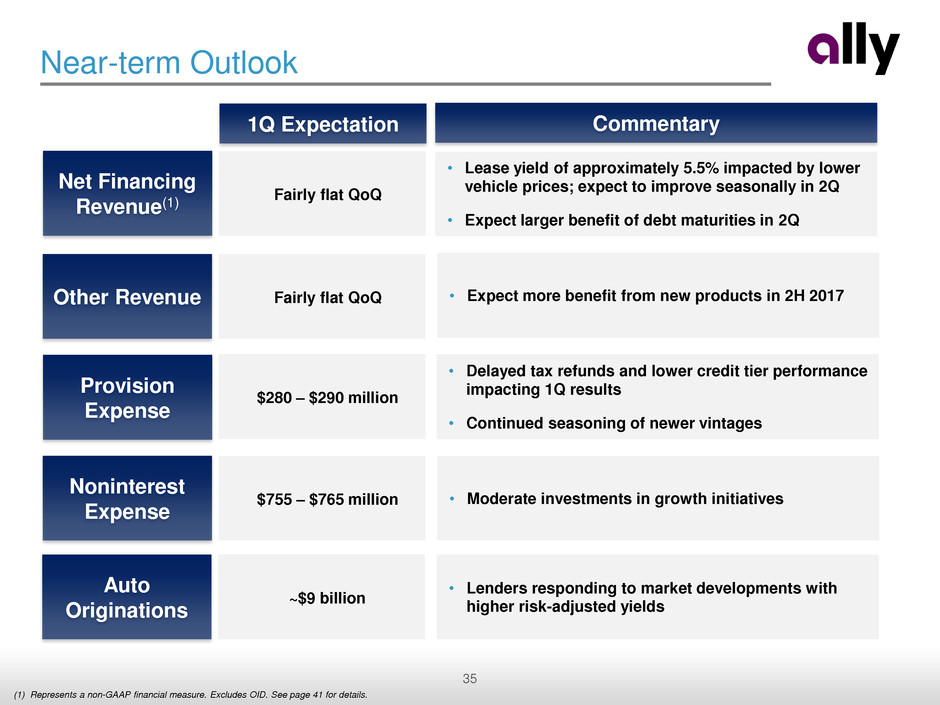
35
Near-term Outlook
Net Financing
Revenue(1)
Provision
Expense
Noninterest
Expense
Fairly flat QoQ
Fairly flat QoQ
$280 – $290 million
$755 – $765 million
1Q Expectation Commentary
• Lease yield of approximately 5.5% impacted by lower
vehicle prices; expect to improve seasonally in 2Q
• Expect larger benefit of debt maturities in 2Q
Other Revenue • Expect more benefit from new products in 2H 2017
• Delayed tax refunds and lower credit tier performance
impacting 1Q results
• Continued seasoning of newer vintages
• Moderate investments in growth initiatives
Auto
Originations
~$9 billion
• Lenders responding to market developments with
higher risk-adjusted yields
(1) Represents a non-GAAP financial measure. Excludes OID. See page 41 for details.

36
Summary of Financial Targets
2017
Medium-term
Target
Adjusted EPS(1) Growth
Core ROTCE(1)
Adjusted Efficiency Ratio(1)
Conclusion and Long-term Trajectory
Progressing down financial path to drive long-term value
5 - 15% 15%+ CAGR
10% +/-
45 - 47% Low 40s%
12% +/-
Attractive and achievable financial targets over time
Self-help drivers are tangible and meaningful – liability and capital management
Quarterly progression subject to manageable variability
Interest rate curve
Quarterly retail auto loss and lease performance
Bank leverage ratio requirement
(1) Represents a non-GAAP financial measure. See pages 39, 40 and 41 for details.
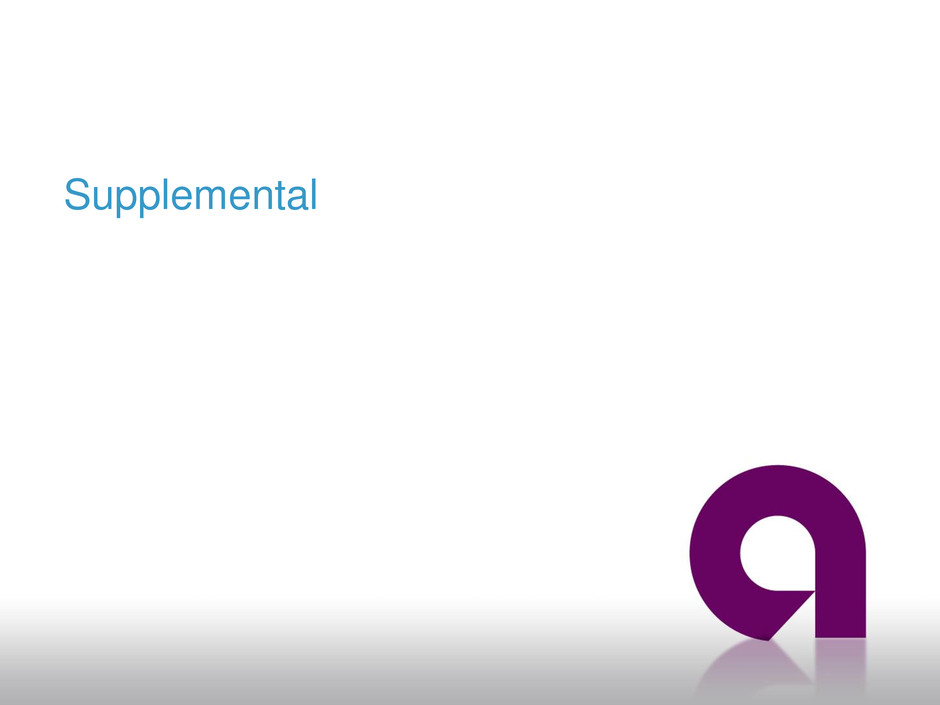
37 CONFIDENTIAL
Supplemental
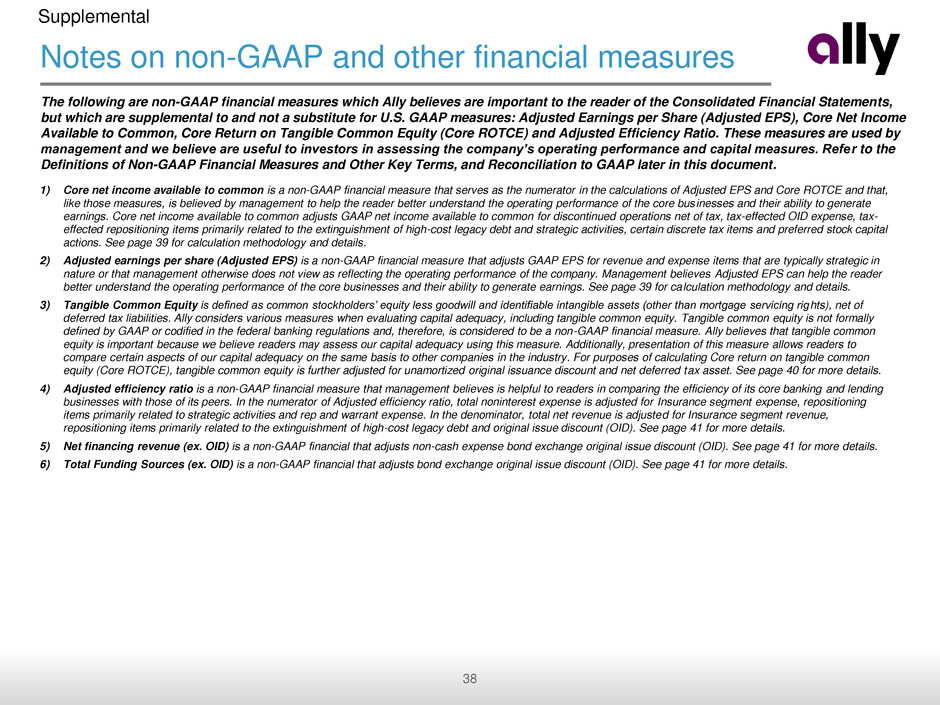
38
Notes on non-GAAP and other financial measures
Supplemental
1) Core net income available to common is a non-GAAP financial measure that serves as the numerator in the calculations of Adjusted EPS and Core ROTCE and that,
like those measures, is believed by management to help the reader better understand the operating performance of the core businesses and their ability to generate
earnings. Core net income available to common adjusts GAAP net income available to common for discontinued operations net of tax, tax-effected OID expense, tax-
effected repositioning items primarily related to the extinguishment of high-cost legacy debt and strategic activities, certain discrete tax items and preferred stock capital
actions. See page 39 for calculation methodology and details.
2) Adjusted earnings per share (Adjusted EPS) is a non-GAAP financial measure that adjusts GAAP EPS for revenue and expense items that are typically strategic in
nature or that management otherwise does not view as reflecting the operating performance of the company. Management believes Adjusted EPS can help the reader
better understand the operating performance of the core businesses and their ability to generate earnings. See page 39 for calculation methodology and details.
3) Tangible Common Equity is defined as common stockholders’ equity less goodwill and identifiable intangible assets (other than mortgage servicing rights), net of
deferred tax liabilities. Ally considers various measures when evaluating capital adequacy, including tangible common equity. Tangible common equity is not formally
defined by GAAP or codified in the federal banking regulations and, therefore, is considered to be a non-GAAP financial measure. Ally believes that tangible common
equity is important because we believe readers may assess our capital adequacy using this measure. Additionally, presentation of this measure allows readers to
compare certain aspects of our capital adequacy on the same basis to other companies in the industry. For purposes of calculating Core return on tangible common
equity (Core ROTCE), tangible common equity is further adjusted for unamortized original issuance discount and net deferred tax asset. See page 40 for more details.
4) Adjusted efficiency ratio is a non-GAAP financial measure that management believes is helpful to readers in comparing the efficiency of its core banking and lending
businesses with those of its peers. In the numerator of Adjusted efficiency ratio, total noninterest expense is adjusted for Insurance segment expense, repositioning
items primarily related to strategic activities and rep and warrant expense. In the denominator, total net revenue is adjusted for Insurance segment revenue,
repositioning items primarily related to the extinguishment of high-cost legacy debt and original issue discount (OID). See page 41 for more details.
5) Net financing revenue (ex. OID) is a non-GAAP financial that adjusts non-cash expense bond exchange original issue discount (OID). See page 41 for more details.
6) Total Funding Sources (ex. OID) is a non-GAAP financial that adjusts bond exchange original issue discount (OID). See page 41 for more details.
The following are non-GAAP financial measures which Ally believes are important to the reader of the Consolidated Financial Statements,
but which are supplemental to and not a substitute for U.S. GAAP measures: Adjusted Earnings per Share (Adjusted EPS), Core Net Income
Available to Common, Core Return on Tangible Common Equity (Core ROTCE) and Adjusted Efficiency Ratio. These measures are used by
management and we believe are useful to investors in assessing the company’s operating performance and capital measures. Refer to the
Definitions of Non-GAAP Financial Measures and Other Key Terms, and Reconciliation to GAAP later in this document.
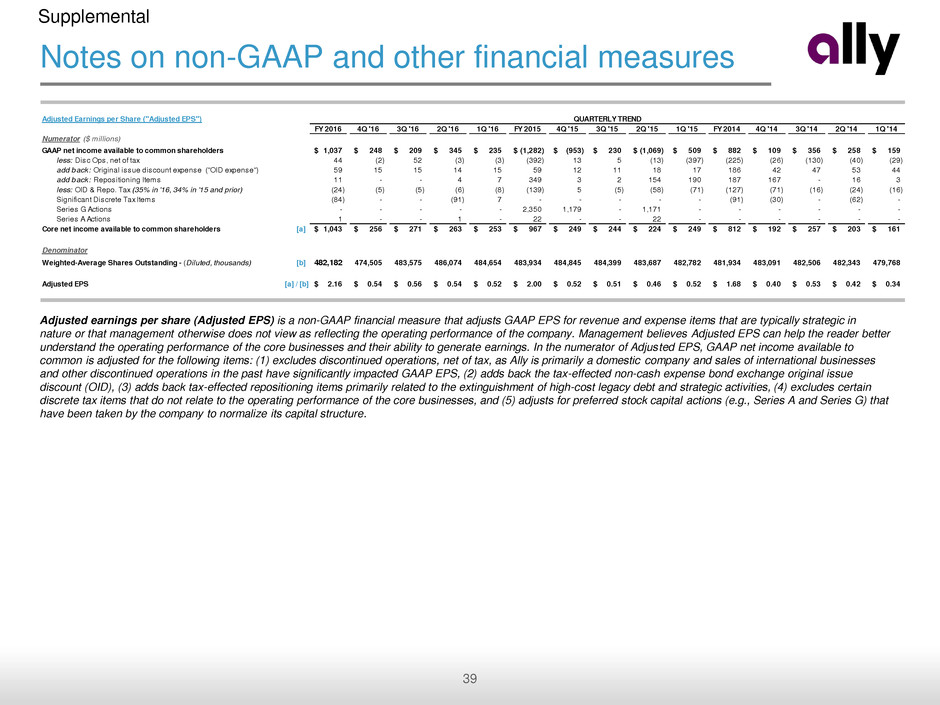
39
Notes on non-GAAP and other financial measures
Supplemental
Adjusted earnings per share (Adjusted EPS) is a non-GAAP financial measure that adjusts GAAP EPS for revenue and expense items that are typically strategic in
nature or that management otherwise does not view as reflecting the operating performance of the company. Management believes Adjusted EPS can help the reader better
understand the operating performance of the core businesses and their ability to generate earnings. In the numerator of Adjusted EPS, GAAP net income available to
common is adjusted for the following items: (1) excludes discontinued operations, net of tax, as Ally is primarily a domestic company and sales of international businesses
and other discontinued operations in the past have significantly impacted GAAP EPS, (2) adds back the tax-effected non-cash expense bond exchange original issue
discount (OID), (3) adds back tax-effected repositioning items primarily related to the extinguishment of high-cost legacy debt and strategic activities, (4) excludes certain
discrete tax items that do not relate to the operating performance of the core businesses, and (5) adjusts for preferred stock capital actions (e.g., Series A and Series G) that
have been taken by the company to normalize its capital structure.
Adjusted Earnings per Share ("Adjusted EPS")
FY 2016 4Q '16 3Q '16 2Q '16 1Q '16 FY 2015 4Q '15 3Q '15 2Q '15 1Q '15 FY 2014 4Q '14 3Q '14 2Q '14 1Q '14
Numerator ($ millions)
GAAP net income available to common shareholders 1,037$ 248$ 209$ 345$ 235$ (1,282)$ (953)$ 230$ (1,069)$ 509$ 882$ 109$ 356$ 258$ 159$
less: Disc Ops, net of tax 44 (2) 52 (3) (3) (392) 13 5 (13) (397) (225) (26) (130) (40) (29)
add back: Original issue discount expense ("OID expense") 59 15 15 14 15 59 12 11 18 17 186 42 47 53 44
add back: Repositioning Items 11 - - 4 7 349 3 2 154 190 187 167 - 16 3
less: OID & Repo. Tax (35% in '16, 34% in '15 and prior) (24) (5) (5) (6) (8) (139) 5 (5) (58) (71) (127) (71) (16) (24) (16)
Significant Discrete Tax Items (84) - - (91) 7 - - - - - (91) (30) - (62) -
Series G Actions - - - - - 2,350 1,179 - 1,171 - - - - - -
Series A Actions 1 - - 1 - 22 - - 22 - - - - - -
Core et income available to common shareholders [a] 1,043$ 256$ 271$ 263$ 253$ 967$ 249$ 244$ 224$ 249$ 812$ 192$ 257$ 203$ 161$
Denominator
Weighted-Average Shares Outstanding - (Diluted, thousands) [b] 482,182 474,505 483,575 486,074 484,654 483,934 484,845 484,399 483,687 482,782 481,934 483,091 482,506 482,343 479,768
Adjusted EPS [a] / [b] 2.16$ 0.54$ 0.56$ 0.54$ 0.52$ 2.00$ 0.52$ 0.51$ 0.46$ 0.52$ 1.68$ 0.40$ 0.53$ 0.42$ 0.34$
QUARTERLY TREND

40
Notes on non-GAAP and other financial measures
Supplemental
Core Return on Tangible Common Equity ("Core ROTCE")
FY 2016 FY 2013
Numerator ($ millions)
GAAP net income available to common shareholders 1,037$ (688)$
less: Disc Ops, net of tax 44 55
add back: Original issue discount expense ("OID expense") 59 249
add back: Repositioning Items 11 244
less: OID & Repo. Tax (35% in '16, 34% in '15) (24) (168)
Significant Discrete Tax Items & Other (84) 602
Series G Actions - -
Series A Actions 1 -
Core net income available to common shareholders [a] 1,043$ 294$
Denominator (2-period average, $ billions)
GAAP shareholder's equity 13.4$ 17.1$
less: Preferred equity 0.3 4.1
less: Goodwill & identifiable intangibles, net of deferred tax liabilities ("DTLs") 0.2 0.3
Tangible common equity 12.9$ 12.7$
less: Unamortized original issue discount ("OID discount") 1.3 1.7
less: Net deferred tax asset ("DTA") 1.2 1.6
Normalized common equity [b] 10.4$ 9.4$
Core Return on Tangible Common Equity [a] / [b] 10.0% 3.1%
Core return on tangible common equity (Core ROTCE) is a non-GAAP financial measure that management believes is helpful for readers to better understand the
ongoing ability of the company to generate returns on its equity base that supports core operations. For purposes of this calculation, tangible common equity is adjusted for
unamortized OID and net DTA. Ally’s Core net income available to common utilized a static 34% tax rate for purposes of calculating Core ROTCE through 4Q 2015. As of
1Q 2016, Ally’s Core net income available to common for purposes of calculating Core ROTCE is based on the actual effective tax rate for the period adjusted for any
discrete tax items including tax reserve releases, which aligns with the methodology used calculating adjusted earnings per share.
(1) In the numerator of Core ROTCE, GAAP net income available to common is adjusted for discontinued operations net of tax, tax-effected OID expense, tax-effected
repositioning items primarily related to the extinguishment of high-cost legacy debt and strategic activities, certain discrete tax items and preferred stock capital
actions.
(2) In the denominator, GAAP shareholder’s equity is adjusted for preferred equity and goodwill and identifiable intangibles net of DTL, unamortized OID, and net DTA.
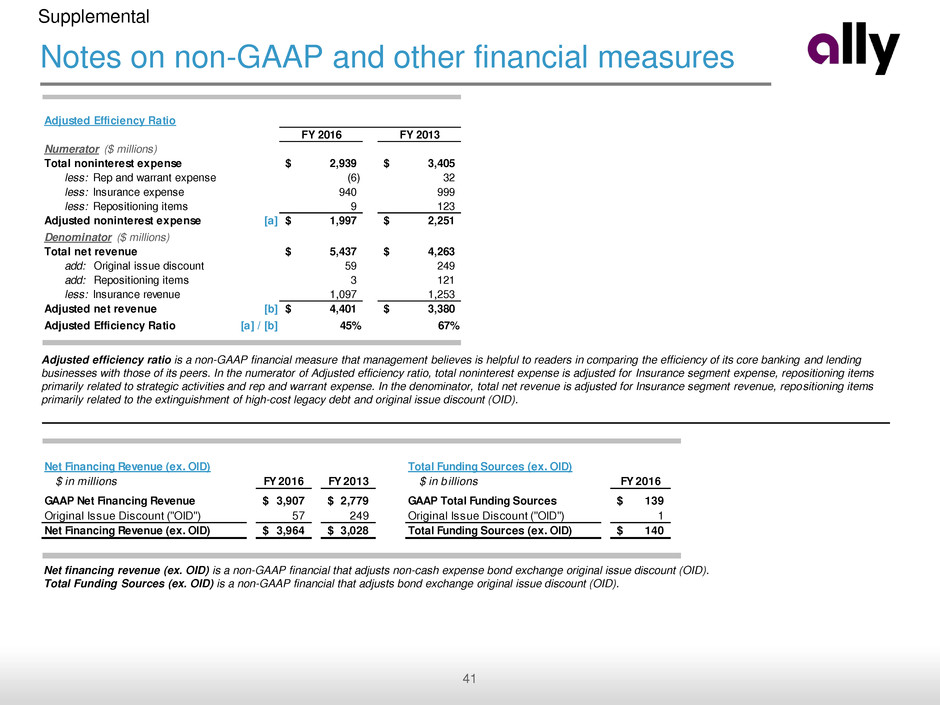
41
Notes on non-GAAP and other financial measures
Supplemental
Adjusted efficiency ratio is a non-GAAP financial measure that management believes is helpful to readers in comparing the efficiency of its core banking and lending
businesses with those of its peers. In the numerator of Adjusted efficiency ratio, total noninterest expense is adjusted for Insurance segment expense, repositioning items
primarily related to strategic activities and rep and warrant expense. In the denominator, total net revenue is adjusted for Insurance segment revenue, repositioning items
primarily related to the extinguishment of high-cost legacy debt and original issue discount (OID).
Adjusted Efficiency Ratio
FY 2016 FY 2013
Numerator ($ millions)
Total noninterest expense 2,939$ 3,405$
less: Rep and warrant expense (6) 32
less: Insurance expense 940 999
less: Repositioning items 9 123
Adjusted noninterest expense [a] 1,997$ 2,251$
Denominator ($ millions)
Total et revenue 5,437$ 4,263$
add: Original issue discount 59 249
add: Repositioning items 3 121
less: Insurance revenue 1,097 1,253
Adjusted net revenue [b] 4,401$ 3,380$
Adjusted Efficiency Ratio [a] / [b] 45% 67%
Net financing revenue (ex. OID) is a non-GAAP financial that adjusts non-cash expense bond exchange original issue discount (OID).
Total Funding Sources (ex. OID) is a non-GAAP financial that adjusts bond exchange original issue discount (OID).
Net Financing Revenue (ex. OID) Total Funding Sources (ex. OID)
$ in millions FY 2016 FY 2013 $ in b illions FY 2016
GAAP Net Financing Revenue 3,907$ 2,779$ GAAP Total Funding Sources 139$
Original Issue Discount ("OID") 57 249 Original Issue Discount ("OID") 1
Net Financing Revenue (ex. OID) 3,964$ 3,028$ Total Funding Sources (ex. OID) 140$
